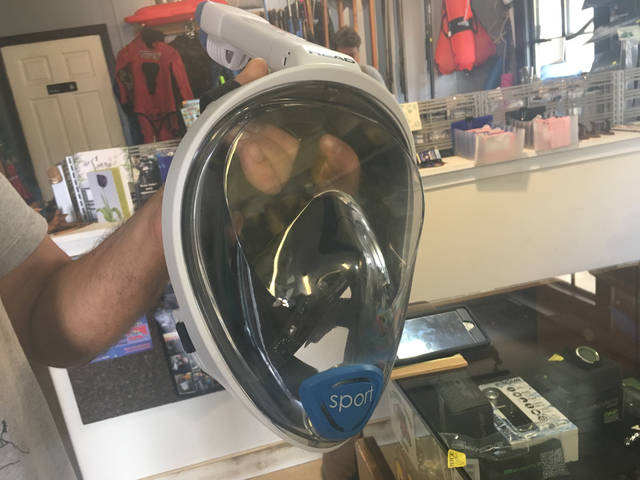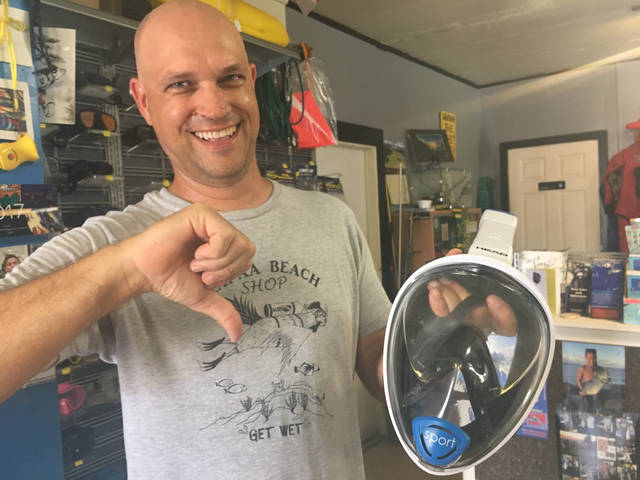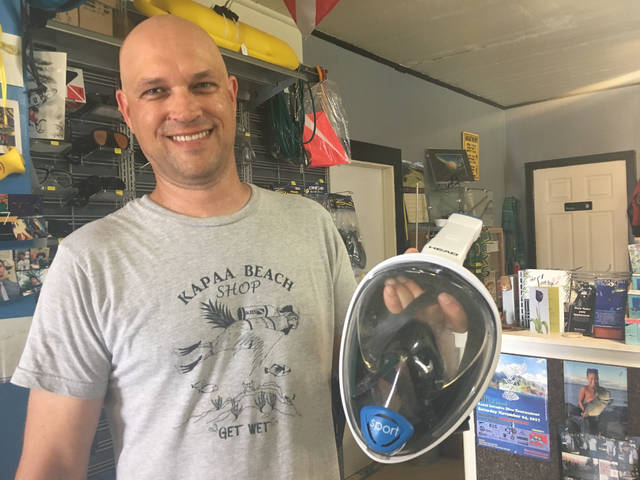KAPAA — A single full face snorkel mask sat in the half-off bin at Kauai Beach Shop on Friday because the dive shop owners just wanted to get rid of it.
“They’re just dangerous and that’s why we’re not going to have them in the store anymore,” said owner Mike Westerhout. “That’s the last one. There’s a few issues with them like the CO2 build-up.”
Oxygen intake can get restricted with the full face masks. Another risk is the potential for the water stopper to get stuck at the top of the snorkel tube, which is built into the forehead area of the masks.
The masks are advertised in in-flight magazines, but lifeguards and water gear retailers on Kauai aren’t stoked about the risks.
In January, two visitors drowned on Maui while wearing full face snorkel masks.
After those deaths, one of the full face mask manufacturers, HEAD/MARES, started conducting specialized tests of different types of masks on the market. Out of four full face snorkel masks the company tested, three of them exceeded the EN250 standard for CO2 exposure at low breathing rates, but they were all within limits for high breathing rates. The HEAD Sport model was the company’s dog in the fight and the only one that came out with full marks.
“The success of the HEAD full face snorkel masks has spawned a number of low-cost copycat masks from little-known companies whose expertise, design and manufacturing experience are unknown. These off-brand products are offered at attractive prices, but their performance and the nature of any research or testing that stand behind them, if any, is completely unknown,” representatives of the company said in a statement.
On Kauai, snorkeling contributes to 23 percent of ocean drownings, according to the state Department of Health.
Robert Winter of Snorkel Bob’s, for instance, refuses to sell the full face snorkel masks, because he doesn’t believe they’re safe.
“We’ve never carried the full face masks, not even at the beginning. They’re terrible,” he said.
Instead of having two separate parts like traditional masks, full face snorkel masks covers the wearer’s entire face with a fixed tube that extends out from the top for breathing. Studies show it can trap carbon dioxide, resulting in depleted oxygen levels, he said, and that can get dangerous.
Westerhout said the decision not to stock the face masks was a bit difficult because they’re so popular.
“The rep came by and showed us all the high-end gear he’s representing, but he said the full face masks are by far the best seller,” he said. “They’re really popular, so it’s a hit to the pocketbook not carrying them.”
Dr. Phillip Foti of Oahu is currently researching those dangers and others associated with ocean activity equipment and has pointed out a dead space in the device’s ventilation that could cause a higher level of CO2 build-up.
Disorientation and loss of consciousness could be the results, and there’s also the possibility of other serious health issues.
“It’s called negative pulmonary edema and the man behind the research, Dr. Foti, refers to the full face snorkeling device as a recipe for disaster,” said Pat Durkin, aquatic expert from Aquatic Safety and a member of the Kauai Lifeguard Association.
Negative pulmonary edema occurs in events like when someone is overbreathing in a snorkel or regulator, which causes fluid to leak into the alveoli in the lungs.
Jim Jung, vice president of KLA, has been considering an experiment with the full face masks for several years.
“Many years ago, I had a full face, but it fogged up quickly,” he said. “I was curious about the new ones on the market. Looking them up, I learned that they were not made for diving, although some used them to dive a few feet below the surface.”
The masks are a bit pricey as well. Online, they range from around $26 to $100 and higher for one mask. On-island, the Aria Full Face Snorkel Mask sells for $99 at places like Kauai Snorkel Rentals in Kapaa.
Jung’s main concern isn’t price, but whether or not they’re safe. “I’m concerned about the carbon dioxide from rebreathing,” he said.
Not everyone is convinced of the dangers of the full face masks, however.
Laola Aea, secretary of the KLA, said she was at a function recently, sitting between two people who had differing views: a woman who represented a full face snorkel mask company and a woman who believed they were unsafe.
“My take is those devices will have warnings (of carbon dioxide risk) on the packaging within a couple of years,” Aea said.
While there are concerns about leaking and carbon dioxide levels, Durkin said there’s another problem with the masks that should be addressed.
“The real problem with the full face snorkeling device is that it furthers the faulty reasoning that anyone can do it,” he said.
Swimming skills are required for safe snorkeling and a full understanding of ocean conditions, as well as an ability to remain calm should something go wrong.
“The usual cause for snorkel fatalities is panic,” Winter said. “One common result is swallowing saltwater if you get caught in a rip tide. We give verbal and written reef etiquette and safety guidelines for every customer.”
Durkin said the old standby snorkels are the best, in his opinion.
“If you still have your old snorkel with no baffles or gadgetry at the opening on top, you have the safest snorkel,” he said. “And if you still have your black rubber mask from Waipouli Variety — gold.”





THEY ARE dangerous…so merchant puts the last one in the ‘half off’ sale bin???? Nice guy!
I have an Aria, like the one Kauai Snorkel Rentals and I LOVE IT!! You should’ve talked to him, his is very knowledgeable about the masks. Why didn’t you interview them?
If the mask is dangerous, why is the store still selling their last one? Even at half price.
I have had a Seaview 180 for three years and have used it in Florida, Mexico, Honduras, and Belize with out any issues. I think it is the people using it incorrect or they had a pre-existing condition.
I bought a knockoff one on Amazon and it failed about 50 feet off shore. It scared me.. And I am an experienced snorkaler. I destroyed it.. Didn’t want anyone else to experience it.
How did it fail?
There’s a lot of paranoia about these masks, undoubtedly incited and exacerbated by the local media. Upon more thorough investigation, there appears to be no legitimate basis for these concerns. Due to TMJ issues, I own and use the Head Sea Vu mask. The only research performed on these masks has shown this particular model to be safe. I’m fed up with being harassed by the misinformed staff of snorkel charters over my use of this mask. This is a problem unique to Hawaii so I have decided to start vacationing elsewhere.
How did it fail?
Official Release from Ocean Reef, the company that invented the first and original full face snorkel mask in 2012…
– Official Statement –
For over 25 years, OCEAN REEF has engineered commercial, professional and military gas masks, full face scuba masks and in 2013 created, with Decathlon, the first ever full-face snorkeling mask (FFSM.) No other company in the world has this much experience nor expertise as Ocean Reef.
Unfortunately, OCEAN REEF’s FFSM products are often confused with ‘knockoffs’ of our original designs. While others can copy our products, they cannot match our knowledge and expertise behind the engineering of our designs. Their lack of understanding of FFSM design, often has resulted in ‘copies’ which have both minor, and major, changes that might make the product unsafe, and often makes the ‘knockoff’ uncomfortable and/or have lower performance than our products.
Because this category of products is relatively new and still considered a novelty by many, poorly designed versions can cause a backlash towards the whole category by consumers who do not know that there are differences. Especially in cases where the product looks like an exact duplicate to the untrained consumer.
As manufacturers, our primary concern is the safe design and production of quality products and to help educate consumers in the selection, and safe use, of our products.
Our FFSMs have undergone multiple, independent-laboratory tests to help insure that what we have designed and produced is well within recognized and documented safety norms. Since, introduction of Ocean Reef designed/produced FFSMs, there are more than 1,000,000 in the world marketplace that have been purchased and safely used by consumers, eager to explore our oceans in comfort and safety.
Of course, Ocean Reef will continue to strive to improve as we have always done during our company’s 70 years in Italy and 20+ years in USA. This will help us continue evolving the FFSM market with improvements and new technology i.e. optical lens kits for those needing glasses and ‘snorkie talkie’ the world’s first two-way communication device allowing snorkelers to talk to each other and those on boat/shore.
When asked for our suggestions by consumers, related to FFSMs, our recommendation is for them to choose equipment from a brand that was the inventor of FFSMs, has 25+ years of experience and expertise in related products, has presented their products for outside, independent testing and is committed to creating new, exciting FFSM products instead from Brands that have ‘sort of’ copied Ocean Reef’s.
We also remind consumers that safety in the water, especially the ocean, is never guaranteed nor should be taken lightly. Snorkelers should make sure that not only do they have proper fitting and functioning equipment, which might also include fins, exposure suits, signaling devices and snorkeling vests, but that they are also aware of all local water conditions and follow lifeguard and marine unit recommendations/warnings. Finally, snorkelers should evaluate their physical abilities before entering the ocean and never snorkel alone.
Very informative Randy!
It isn’t shocking they never spoke to anyone with “research” vs “Opinion”
So Maui reports 2 … TWO … Full face snorkel deaths (with who knows what brand – left out on purpose … didn’t meet the juiciness of the story). How many folks have died using the old fashioned ones?
Hey you guys against the Full Face Masks, let’s compare the numbers…. Full Face mask drownings vs regular snorkel drownings….which one seems safer?
I am a very healthy and fit 68 year old male. I have been around the Ocean since I was young. I am a PADI certified scuba diver and I have great respect for but little fear of the open waters of the sea.
I am currently undergoing extensive dental work and thought that a Full-Faced Mask might aid me when snorkeling. I purchased that mask at our local COSTCO here on Maui HI, where I reside.
I tested the new mask made by HEAD in calm shallow waters, then on Feb 1, 2019 set out to snorkel the waters around the Molokini Crater off Maui.
The seas where a bit choppy that morn but nothing hazardous to an experienced snorkeler such as myself. After 15-20 min in the water, I remarked to my buddies that I was impressed with the overall fit and feel of the mask, however I had experienced periodic, what appeared to be closing of valves while breathing. This was disturbing. I remained calm and continued my trek. As I continued, I began to experience dizziness and disorientation. I thought it could be sea-sickness, however I never get sea-sick.
The next session in the water, again was around 15-20 min, and I again had the same sensations, almost flu-like and drunken in nature. Nausea extreme fatigue and stomach irritation came over me. I then started for the boat and safety finding it very difficult to get there due to leg cramps setting in.
At the same time I experienced a sense of darkness and things about me where closing in and going grey. I nearly passed out!
Bottom line…In my opinion if I had not been as experienced and strong as I am…I WOULD HAVE BEEN DEAD! Do not use a HEAD Full-Face Snorkel Mask!
Thomas Willman
Maui Hi